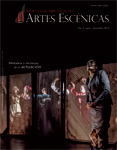Authors
Abstract
This article is the product of the doctoral thesis “Rethorical variations on the word of God (Dieu) In Valère Novarina’s written work” that was carried out as a requirement in the Humanities Doctoral Degree at te Pompeu Fabra University from Barcelona (Spain) under the direction of Amador Vega Esquerra. The purpose of this project is to uncover the theological context of the word God (Dieu) in Valère Novarina’s written work. The project explores the ambiguous and fundamental role the word God (Dieu) in Novarina’s work as an opening device to emptiness and as invocation of God through language, analyzing its aesthetic and theological implications. This way, a connection between the emerging post-dramatic theater theory and criteriology is offered for the study of the saint and the sacred in contemporary art. The study approach is qualitative and is framed in the Compared Theater studies of inductive approach: an approximation to each of its texts in a particular way in order to explain its specific nature (Micropoetics); later, a morphology of the complete play is established mainly around the rethoric related with God’s word (Macropoetics) in order to, finally, enter into dialogue with theatrical theories of theological interest (Archipoetics). This article offers an introductory panorama of the main ideas that the French artist Valère Novarina suggests around actuation in his first reflexive text, Letter to the Actors. To start with, the article presents a contextualization of the Novarinian work; later the main characteristics of the work L´atelier Volant, whose rehearsal sessions serve Novarina as a stimulus to write the letter, are commented; finally, provocative ideas the author traces in what will be the base for his conception around theater and the actor’s job are exposed.
References
Allen, L.E. (2006). Valere Novarina’s “Lesson in Obscurity” [La “Leçon d’obscurité” de Valère Novarina]. Thèse de Philosophie, sous la direction d’Antoine Compagnon, Columbia University, États-Unis.
Bouchardon, M. (2005). Théâtre-Poésie. Limites non-frontières entre deux genres du symbolisme à nos jours. Thèse de doctorat de Langue et Litt érature françaises, sous la direction de Claude Leroy, Université de Paris X-Nanterre.
Chénetier-Alev, M. (2004). L’Oralité dans le théâtre contemporain: Herbert Achternbusch, Pierre Guyotat, Valère Novarina, Jon Fosse, Daniel Danis, Sarah Kane. Thèse de doctorat d’Études théâtrales, sous la direction de Jean-Pierre Sarrazac, Université de Paris III-Sorbonne Nouvelle.
Dubouclez, O. (2005). Valère Novarina, la physique du drame. Paris: Presses du réel.
Erfani, A. (2011). Breath and Whispers: The “Theatrical” Writings of Beckett , Koltès, Novarina, and Derrida. Thesis In French Literature. Emory University, United States of America.
Huff man, S. (2007). Gallicismes/Barbarismes: autour du confl it langagier dans L’espace furieux et Le repas de Valère Novarina.L’Annuaire théâtral: revue québécoise d’études théâtrales, 42, 31-40.
Klein, J.-P. (2007). L’incarnation progressive.L’Annuaire théâtral: revue québécoise d’études théâtrales, 42, 41-50.
Le Ny, J. (2002) Valère Novarina: Una obra para descubrir en los escenarios. Primer Acto:Cuadernos de investigación teatral, 292, 16
Novarina, V. (1974). L´atelier Volant. París:POL.
________. (1984). Le drame de la Vie. París: POL.
________. (1991). Pendant la matière. París:POL.
________. (1989). Le théâtre des paroles. París:POL.
________. (1999). Devant la parole. París: POL.
________. (2003). El animal del tiempo, Para Louis de Funès, Carta a los actores. Madrid:Teatro del astillero.
________. (2009). L´envers de l´esprit. París:POL.
Padovani, D. (2011). Le théâtre du monde chez les auteurs dramatiques contemporains francophones.Arts du spectacle. Université Paul Válery – Montpellier III, Francia.
Poulin, P. (2009). Excommunication: la puissance de la création langagière contemporaine. Thèse en litt érature. Université de Montréal, Canada.
Pringent, C. (2002) La palabra de Valère Novarina : La lengua contra los ídolos. Primer Acto: Cuadernos de investigación teatral, 292, 17-24.
Ramat, C. (2007). La Comédie du verbe. Le comique et le sacré dans l’oeuvre de Valère Novarina. Thèse de doctorat de Litt érature française et Arts du spectacle, sous la direction de Pierre Jourde, Université de Stendhal-Grenoble III.
Rompré, V. (1999). Corps, théâtre, parole: Étude de La chair de l’homme de Valère Novarina. Mémoire présenté à la Faculté des études supérieures de l’Université Laval, Canada.
Toulze, T. (2010). Le Sacrifi ce comique de Valère Novarina. Étude rhétorique de la période 1975-2004. Thèse de doctorat de Lett res et Arts, sous la direction de Bernadett e Bost, Université de Lyon II.
Tremblay, N. (2008). Le Théâtre et l’origine dans l’oeuvre de Valère Novarina. Thèse d’Études litt éraires, UQAM-Université du Québec à Montréal, Canada.
Weiss, A. (1989). The Aesthetic of Excess. Albany: University of New York.
________. (1996). Preface. In Novarina, V. The theater of the ears. New York: Sun & Moon.

 PDF (Español)
PDF (Español)
 FLIP
FLIP









